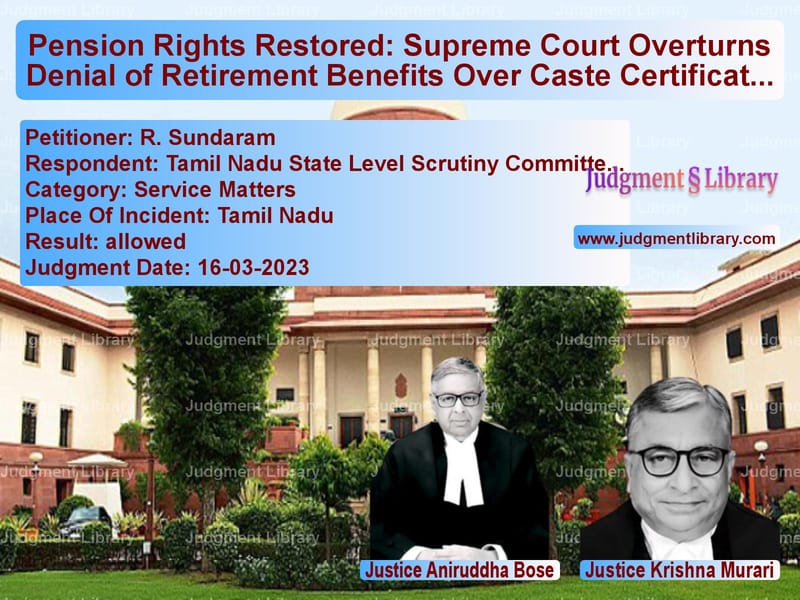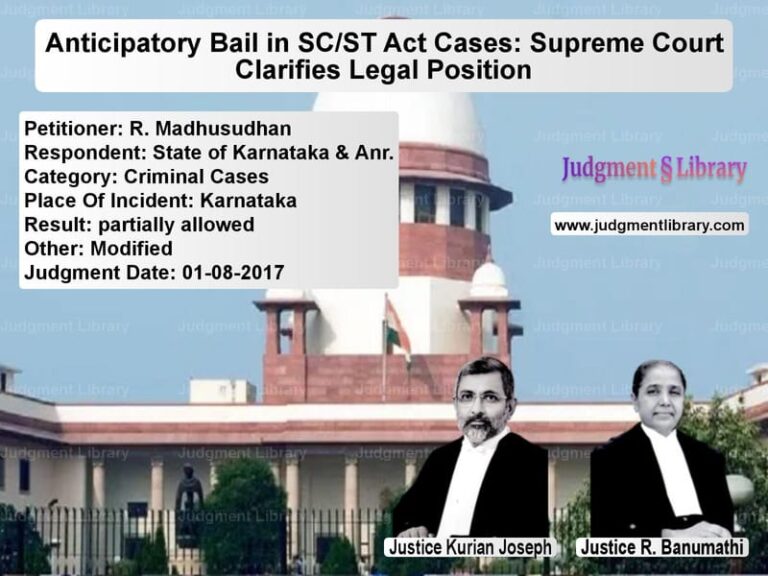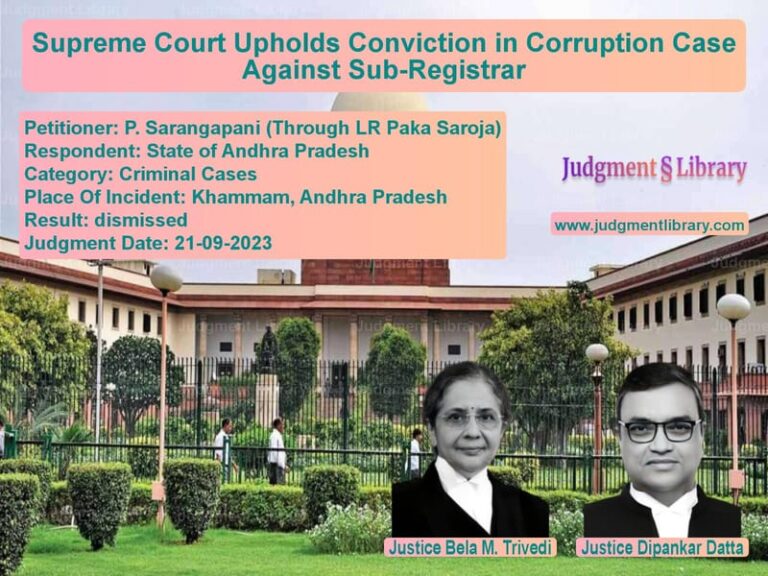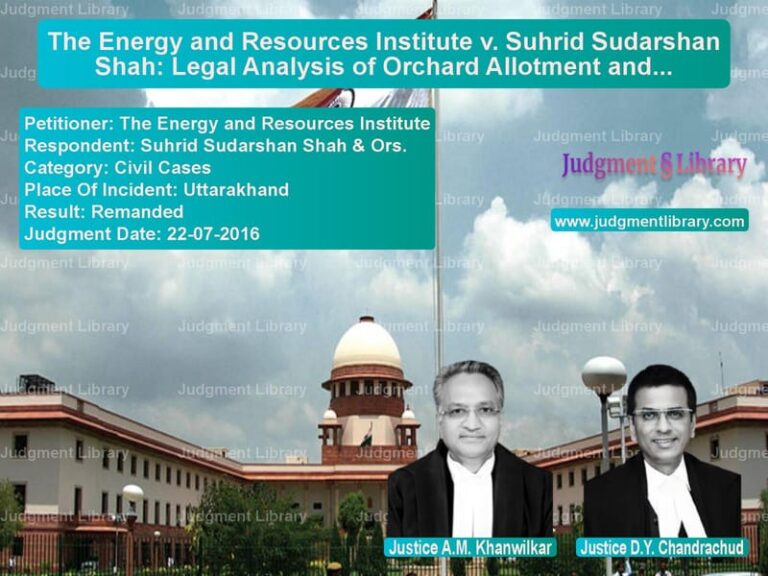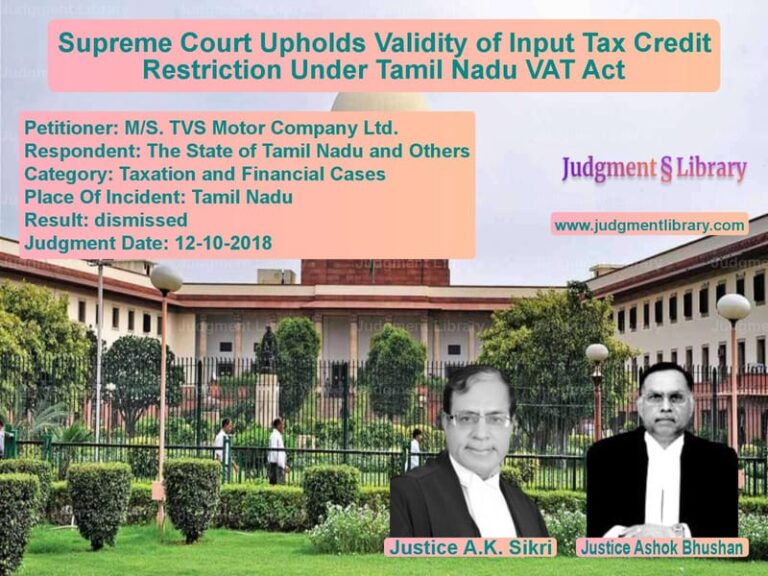Pension Rights Restored: Supreme Court Overturns Denial of Retirement Benefits Over Caste Certificate Dispute
The Supreme Court of India recently ruled in favor of R. Sundaram, a retired bank officer who was denied his post-retirement benefits due to an alleged fraudulent caste certificate. The case, R. Sundaram v. The Tamil Nadu State Level Scrutiny Committee & Ors., highlights the importance of due process, procedural fairness, and the constitutional right to pension.
The judgment reaffirms that pension benefits cannot be arbitrarily withheld and that an individual’s identity, especially concerning caste status, cannot be questioned without a fair hearing.
Background of the Case
R. Sundaram was appointed as a clerk-cum-shroff in a bank in Tamil Nadu in 1975 based on a community certificate verifying his status as belonging to the Konda Reddy Community, a Scheduled Tribe. He served for 38 years and retired as a Scale 3 officer. However, two days before his retirement, he was issued a cessation order alleging that his caste certificate was false. Consequently, all his retirement benefits, except the Provident Fund, were withheld.
The controversy surrounding his caste certificate began when the District Collector, without conducting an inquiry, canceled his community certificate. This led to multiple rounds of litigation before various courts and committees.
Legal Battle and High Court Decisions
To contest the cancellation of his certificate, Sundaram filed W.P. No. 12546 of 1998 in the Madras High Court. The Court ruled in his favor, ordering a fresh inquiry by the Tamil Nadu State Level Scrutiny Committee (TN SLSC). However, despite this ruling, the scrutiny process dragged on for years, and Sundaram retired without receiving his benefits.
In 2013, he again approached the High Court in W.P. No. 19006 of 2013, seeking his pension and gratuity. The Court directed TN SLSC to complete its inquiry within eight weeks. Meanwhile, Sundaram also approached the Supreme Court, which instructed him to cooperate with the scrutiny proceedings. However, the process remained unresolved.
Finally, in 2017, the scrutiny committee concluded that Sundaram did not belong to the Konda Reddy Community and issued a show-cause notice. Sundaram challenged this in W.P. No. 33207 of 2017, and the Madras High Court quashed the committee’s findings and ordered a fresh review.
Despite this, TN SLSC reaffirmed its earlier conclusion in a second inquiry. In response, Sundaram filed another petition, W.P. No. 28295 of 2018, which was dismissed. His review petition was also rejected in Review Application No. 157 of 2019. Left with no other recourse, Sundaram approached the Supreme Court.
Arguments of the Parties
Petitioner’s Arguments (R. Sundaram)
- The cancellation of his caste certificate was done without following due process.
- Despite multiple court orders, the scrutiny process was delayed for 19 years, causing undue harassment.
- The scrutiny committee failed to allow him the right to cross-examine witnesses and did not furnish necessary documents.
- The cessation order was illegal as no case was pending against him at the time of retirement.
- The denial of pension and retirement benefits violated his constitutional rights.
Respondent’s Arguments (Tamil Nadu State Level Scrutiny Committee & Others)
- Due notice was given to Sundaram, but he failed to appear for proceedings.
- The caste verification was conducted in accordance with legal procedures.
- The scrutiny committee’s report was based on vigilance reports and expert findings.
- Since Sundaram’s certificate was deemed false, he was not entitled to benefits granted under a reserved category.
Key Observations of the Supreme Court
The Supreme Court analyzed the facts and found multiple violations of due process and fundamental rights. The key observations of the Court were:
- Pension is a constitutional right: The Court cited State of Jharkhand v. Jitendra Kumar Srivastava (2013) 12 SCC 210, emphasizing that pension is a constitutional right under Article 300A and cannot be denied arbitrarily.
- Violation of natural justice: The scrutiny committee did not allow Sundaram to cross-examine witnesses or access documents, violating the principles of Audi Alteram Partem (right to be heard).
- Unexplained delay: The Court criticized the state’s failure to conclude the scrutiny process within a reasonable timeframe, stating that a 19-year delay was unjustifiable.
- Burden of proof on the state: The government failed to establish that Sundaram’s caste certificate was fraudulent beyond a reasonable doubt.
- Failure to comply with Madhuri Patil guidelines: The Court cited Madhuri Patil v. Additional Commissioner, Tribal Development (1994) 6 SCC 241, which mandates a time-bound and transparent verification of caste certificates.
Final Ruling
The Supreme Court set aside the High Court’s orders and ruled:
- The scrutiny committee’s findings were invalid due to procedural lapses.
- The cessation order was unlawful and could not be sustained.
- Sundaram was entitled to his full post-retirement benefits.
- The bank was directed to release all withheld benefits with 6% simple interest from the date of retirement.
Accordingly, the appeal was allowed, and Sundaram’s pension rights were restored.
Implications of the Judgment
This ruling has broad implications for employment rights and caste verification procedures:
- Strengthening pension rights: The judgment reaffirms that pension is a vested right that cannot be denied arbitrarily.
- Ensuring due process: The case underscores the need for fair hearings in caste verification proceedings.
- Time-bound verification: The Court emphasized that caste inquiries should not remain pending indefinitely.
- Protection against harassment: The judgment highlights that employees cannot be victimized through delayed administrative procedures.
Conclusion
The Supreme Court’s decision in R. Sundaram v. Tamil Nadu State Level Scrutiny Committee is a landmark ruling reinforcing the principle that pension is not a privilege but a constitutional right. The judgment also serves as a warning against administrative delays and procedural unfairness in caste verification matters.
Read also: https://judgmentlibrary.com/supreme-court-upholds-police-authoritys-discretion-in-recruitment-case/
By ruling in favor of Sundaram, the Court has ensured that procedural lapses and bureaucratic harassment do not deprive individuals of their rightful benefits. This case sets an important precedent in protecting pensioners from arbitrary state actions.
Petitioner Name: R. Sundaram.Respondent Name: Tamil Nadu State Level Scrutiny Committee & Ors..Judgment By: Justice Aniruddha Bose, Justice Krishna Murari.Place Of Incident: Tamil Nadu.Judgment Date: 16-03-2023.
Don’t miss out on the full details! Download the complete judgment in PDF format below and gain valuable insights instantly!
Download Judgment: r.-sundaram-vs-tamil-nadu-state-lev-supreme-court-of-india-judgment-dated-16-03-2023.pdf
Directly Download Judgment: Directly download this Judgment
See all petitions in Pension and Gratuity
See all petitions in Employment Disputes
See all petitions in Disciplinary Proceedings
See all petitions in Public Sector Employees
See all petitions in Judgment by Aniruddha Bose
See all petitions in Judgment by Krishna Murari
See all petitions in allowed
See all petitions in supreme court of India judgments March 2023
See all petitions in 2023 judgments
See all posts in Service Matters Category
See all allowed petitions in Service Matters Category
See all Dismissed petitions in Service Matters Category
See all partially allowed petitions in Service Matters Category

